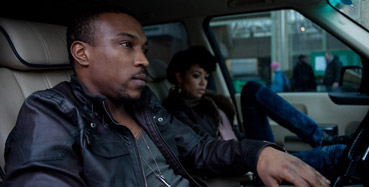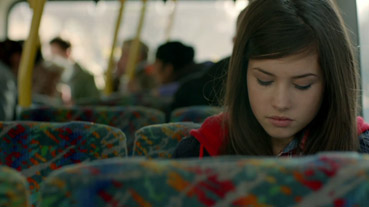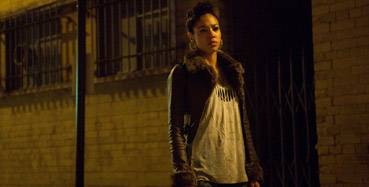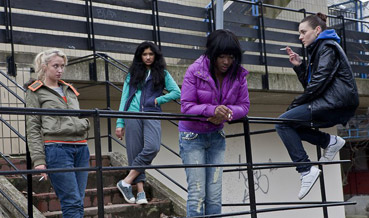"If you wake up at a different time, in a different place,
could you wake up as a different person?" |
Chuck Palahniuk, Fight Club (1996) |
Our identity is in constant flux. It can change because of culture, through the knowledge we're exposed to. It can change because of the clothes we wear or the way we choose to speak. It can change because of the people we meet. It can change because of a singular event that divides our lives in two; before and after, and never the twain shall meet. For Kayla (newcomer Aimee Kelly), the 16-year-old at the centre of Nirpal Bhogal's Sket, this life-changing event is just around the corner. Once it happens, she'll never be quite the same again.
Kayla is newly arrived in East London from Newcastle with her older sister Tanya (experienced theatre actress Katie Foster-Barnes, who made her film debut in Tracey Emin's Topshot). The sisters have travelled down to make a fresh start, following the death of their mother. Kayla resents the move, and wants to go back to her old life, while Tanya just wants to keep her on the straight and narrow, hoping to repair the strained relationship with their estranged father. Despite Tanya's efforts, the distance between her and Kayla grows. Isolated and lonely in unfamiliar surroundings, shy Kayla navigates the city, constantly on alert. While travelling on a bus, she crosses paths with Danielle (Emma Hartley-Miller, seen previously in Stuart Davids and Caroline Paterson's Wasted), and her gang: Hannah (Lily Loveless, well known for her roles in Skins and The Fades), Kerry (Adelayo Adedayo, a fellow Skins alum), and Kiran (Varada Sethu, the lead in Gurbaksh Ronak Singh's short Impressions). The girls intervene when Kayla attracts unwanted attention from some older boys. The girls beat them up, with Danielle kicking one down the stairs to the lower deck. When the girls run off the bus, a shocked Kayla follows and tries to thank them for their help. They shrug off the event, and tease her instead, but she holds her own, even when they close ranks. Despite this resistance, Danielle invites her to meet with them again the next day. Kayla is keen, obviously relieved to be, at last, making a connection with someone other than her sister. It's a chance meeting, a neat twist of fate, but she'll come to need much more than their friendship.

Meanwhile, across London, for drug dealer and leader of a rival gang, Trey (Ashley Walters, the film's most recognisable face) and his runner-turned-girlfriend Shaks (Riann Steele, last on screen in Jamie Thraves' Treacle Jnr), it's business as usual. After years at the top of the food chain, Trey is starting to falter, concerned about those who threaten to undermine him, and even his trust in Shaks is beginning to wane. When a deal falls through, he's convinced that she's not doing her job properly. Though she's still faithful to him, she's grown tired of their lifestyle and his constant demands. She wants out, but he's unwilling to listen. This is the only life he knows. Things come to a head between them when he's forced to dispatch one of his boys to finish what she started. Cornering her outside a café, he lets his anger fly, pinning her against a nearby shop, shouting abuse. From inside the café, waiting for Kayla to arrive, Tanya witnesses the argument. As things escalate, she comes outside and tries in vain to diffuse the situation, but instead, Trey's anger grows, tenfold. Blinded by his rage, he transfers it from Shaks to Tanya, and brutally attacks her, leaving her for dead. Hospitalised, and in a coma, she clings to life, with a terrified Kayla watching over her. In the middle of the night, Tanya dies, leaving Kayla truly alone. Wracked with grief, guilt, and anger, she turns to Danielle and the girls once more, determined to secure their help in avenging her sister's death.
Made in collaboration with The Safe 'N' Sound Youth Project in Peckham, Sket (street slang for a promiscuous girl) is writer-director Nirpal Bhogal's first full-length feature. It premiered at this year's London Film Festival before going on immediate release. Following work directing music promos and other experimental shorts, Bhogal's break came with the short film Cold Kiss, which focuses on the effects of knife crime, and was co-produced by Colin Knox (father of murdered actor Robert Knox) and Ray Winstone, who also stars in the film. The short caught the attention of Nick Taussig (producer of Mo Ali's Shank), who was keen to create a feature on girl gangs, having picked up on their increased presence in newspapers, and youth workshop discussions prior to Shank's release. He approached Bhogal with the idea, and research on the project began. Determined that the film should be as realistic as possible, Bhogal talked with current and former gang members (including Safe 'N' Sound's founder, Jennifer Blake) about their experiences, weaving their knowledge into the script, itself drawn from his own life growing up in East London. Over the course of the production, Marc Sutcliffe, a frequent visitor to Safe 'N' Sound, was taken on as a consultant and acted as a mentor to the cast throughout the film's four-week shoot.

In our current climate, Sket's arrival is timely. The film's subject-matter carries strong social and cultural resonances, but it also finds itself in something of a crowded, male-dominated cinematic marketplace. The success of films like Sket's labelmate, Shank, Menaj Huder's Kidulthood, and its Noel Clarke-directed follow-up, Adulthood, prove that the appetite for such material exists, perhaps to the point that the term ‘youth cinema' can be applied to describe this ever-expanding subgenre. Sket sits comfortably in such company and employs the same aesthetic values, as well as populating both soundtrack and cast predominantly with emergent UK talent. Shank's casting director, Jane Ripley, who is well-known for her work on Skins, also works her magic here. However, such associations come at a price, because the very realism that Bhogal and his team were at pains to recreate also causes consternation.
Like many similarly-themed films before it, such as Penny Woolcock's Birmingham set gun-gang drama, 1Day (pulled by the Odeon cinema chain in the wake of negative reaction), Sket too, has, despite being passed by the BBFC without cuts, met with a degree of censorial wrath, resulting in promotional posters being pulled from the London Underground and the commuter newspaper, Metro. Depending on which side of the fence you sit, this is either a justified or dubious moral decision, but, in many ways, this reaction is endemic of the treatment of young people in general, and highlights why the film had to be made. Choices like these are an act of denial. A denial of violent behaviour, undoubtedly, but also a denial of the existence of girls like Danielle and her gang in society. Cast aside because they don't fit within our rubric of social mores, such marginalisation means they become more disenfranchised, angry and frustrated, perpetuating their behaviour.
Notoriety, of course, carries its own special cultural cachet. The act of banning a film just heightens enthusiasm for it. The controversy that has consistently followed the work of Larry Clark, from Kids to Ken Park, is proof of that. In the case of Sket, the extra attention brought to its story and content are ultimately a good thing. Why? Because it's much more than a flashy, fast-talking, violent film about a girl gang. Cast aside your preconceived ideas and instead consider its merits. Cinema is, after all, a mirror, reflecting the society they are it is created for. Sometimes the reflection isn't kind, but it doesn't make the vision any less truthful.

In fact, the film's aesthetic and thematic roots are more closely tied with social realism, than with its youth-oriented contemporaries, particularly Ken Loach's Sweet Sixteen, Andrea Arnold's Fish Tank, and Peter Mullan's Neds (the parallels between Kayla's journey and that of schoolboy John McGill are striking). Elsewhere, there are echoes of Kubrick's A Clockwork Orange,Walter Hill's The Warriors and most obviously, Mathieu Kassovitz's seminal La Haine/Hate. Of course, it's easy to rattle off points of reference for any cinematic work, but Sket is no mishmash of styles. It has its own visual identity, which is both atmospheric and beautifully shot by cinematographer Felix Wiedeman (who also worked on Adam Deacon's directorial debut, Anuvahood, and the current series of Misfits). The amber-infused palette Bhogal selected for the often rain-slicked night scenes, in particular, give the streets an eerie, sometimes otherworldly feel that contrasts sharply with the look of its brighter, daytime counterparts. Though not a new idea, it's incredibly effective here, reinforcing the alienation Kayla feels in her new surroundings.
London locales, such as the iconic Rowley Way Estate, now Grade II listed and a firm location fixture, are just as important to this film as the characters are. The rows of uniform houses and the tower blocks add to general feeling of claustrophobia, packing in the girls in like battery hens as we watch them walk the same routes. Shaks stalks across her well-worn territory like a lioness, cigarette in hand. Kayla, by contrast, is the prey in more ways than one, with headphones in her ears and her (Little Red Riding) hood up – to keep the noise and the wolves at bay. As the old adage goes: familiarity breeds contempt.
Sket is a film about choices, or the lack of them. The girls are bound by the life they've chosen. Shaks, constantly oppressed by Trey, is gradually withdrawing, both physically and emotionally from the world around her. She wants to change, she wants more, but isn't sure of how to achieve either without breaking her bond with Trey. She's a shadow of her former self. Just as Shaks is bound to Trey, Danielle and her girls are bound to each other. Hannah in particular, is loyal to Danielle to the point of devotion. As her right hand woman, she forms the parental figures in a dysfunctional pseudo-family unit, with Kerry and Kiran the mischievous unruly children, and Kayla, the baby they all come to care for as well as take care of. Therein lies the paradox: built on the foundations of fear, but with an empathy that runs deeper than blood, they couldn't leave each other, even if they wanted to. The strict codes of gang life have taken their toll on everyone, turning them into regimented soldiers, battle-hardened, having adapted to their surroundings. They've become de-sensitised to everything, existing instead of living. Over the course of the film, Kayla too, undergoes this process. Comparing the girl at the end of the film, to the one we see at the beginning is heartbreaking.

Likewise, a subplot with Kerry and Ruds (Richie Campbell, reunited with Ashley Walters in Yann Demange's Top Boy) shows just how engrained their attitudes towards rape and violence have become. On the one hand, it's normal, expected, and so casual that it's alarming. On the other, the violence they use to retaliate is as vital as breathing. It's the way they keep their heads above water, when it's far too easy to sink beneath waves. There's nothing remotely gratuitous or glamorous about that violence either. Never without motive, it always rears its head when the girls have been wronged in some way, and the brutality of it – most obviously when Trey attacks Tanya – takes the shine off it for anyone thinking about imitation.
Yes, the actions of the girls are hard to watch, and even harder to stomach, but there's a valid reason for them. As a film that has been created to cast light on a social problem and open up debate, the spotlight it uses to do it has to be harsh. Sket shows, in no uncertain terms, that life in today's Britain is hard and cruel, but it doesn't fall into the trap of pessimism or surrender to the entrenched dread that our country is not what it once was – with the implication that blame should be squarely placed on the shoulders of its youth – that pervades many films like this, such as James Watkins' Eden Lake and Daniel Barber's Harry Brown. The story Bhogal presents isn't about preaching, making excuses or justifying behaviour. Instead, what he dares to do is allow a space for the audience to empathise and understand these girls; to show compassion for a section of society that is all-too-frequently misjudged and vilified. Underneath it all, they're still human, and as Kayla's story proves, it's easy, terrifyingly easy, to fall through the cracks and find yourself trapped with no means of escape. Her story is one of many, and there are countless, untold, real-life versions of it unfolding on our city streets every day.
Sket is a labour of love that's compellingly written and stylishly directed by Bhogal, who has the potential to become an important voice in contemporary British cinema. The film's emotional power comes from the strength of its young, talented cast, who bring an energy and honesty to a script that would've read very differently in other hands. Their chemistry as a group is what makes the film work so well. Loveless, Hartley-Miller and Kelly are particularly affecting; and together, are the heart of this haunting, cautionary tale, whose images will linger long in the mind.
The moral of this story is, ultimately, a simple one: don't judge a book by its cover. |